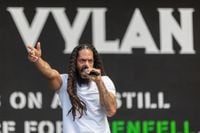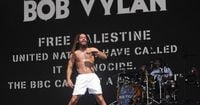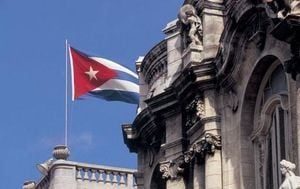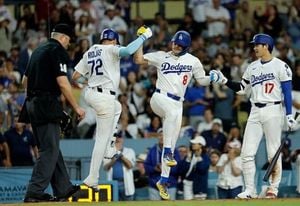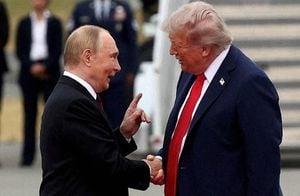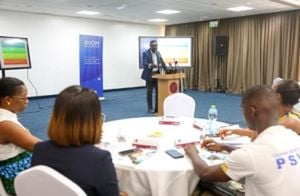The English punk-rap duo Bob Vylan, known for their politically charged performances and outspoken views on global conflicts, have found themselves at the center of a heated national debate after their Glastonbury Festival set sparked outrage, prompted a BBC apology, and triggered police investigations. Yet, undeterred by the controversy swirling around them, the band has announced a new tour, with a stop at Glasgow’s O2 Academy scheduled for November 6, 2025.
It all began during the 2025 Glastonbury Festival, when Bob Vylan—comprised of members Bobby Vylan and Bobbie Vylan, who formed the band in Ipswich in 2017—took to the stage with a set that quickly captured headlines far beyond the music press. Their performance included a chant of “death, death to the IDF,” a reference to the Israel Defence Forces, and vocal support for Palestine. The moment, which was broadcast by the BBC, ignited a firestorm of criticism and forced the broadcaster’s director-general, Tim Davie, to answer tough questions from both the public and Parliament.
According to BBC reporting, Tim Davie described the decision to air Bob Vylan’s performance as “a very significant mistake” and “deeply disturbing.” Speaking to the Culture, Media and Sport Committee on September 9, 2025, Davie recounted his reaction upon learning what had been broadcast: “I don’t think I misread it, I just got there (to Glastonbury) when I heard about it (at) about five o’clock … the performance was well done by then, and at that point I knew absolutely that it was an antisemitic broadcast.” He went on to explain his immediate response: “So, my decision was to get that off on demand, simple as that, I mean, it wasn’t too complicated in my mind, and to your point, I do think it was deeply disturbing, deeply disturbing.”
Davie’s swift removal of the set from BBC’s on-demand services did little to quell the controversy. The BBC faced criticism not only for airing Bob Vylan’s performance but also for its earlier decision to withhold the broadcast of Irish rap group Kneecap’s Glastonbury set, citing concerns about their potential comments on Palestine and Israel. The apparent inconsistency in editorial decisions left many questioning the broadcaster’s standards and judgment.
Glastonbury organiser Emily Eavis also weighed in, telling reporters that the chants “very much crossed the line.” Her remarks echoed the growing sentiment that the festival, which has long prided itself on being a space for activism and free expression, must also grapple with the boundaries of acceptable speech—especially when broadcast to millions.
The fallout didn’t end with public statements. According to BBC News, both Avon and Somerset Police and the Metropolitan Police launched investigations into Bob Vylan’s actions at Glastonbury, as well as alleged comments made during a May 2025 performance supporting Iggy Pop at London’s Alexandra Palace. The band’s chant of “death, death to the IDF” was widely condemned by Jewish advocacy groups and others as antisemitic, while some activists and fans defended the duo’s right to protest what they see as injustices in the ongoing Israel-Hamas conflict.
Bob Vylan, for their part, have not shied away from the spotlight. In the wake of the Glastonbury uproar, the duo took to social media to reaffirm their commitment to speaking out. “After all the attempts to silence us, we’re about to be louder than ever. We won’t go quietly,” they posted, signaling that the controversy had only strengthened their resolve. Band member Bobby Vylan also shared a more reflective statement: “As we grow older and our fire starts to dim under the suffocation of adult life and all its responsibilities, it is incredibly important that we encourage and inspire future generations to pick up the torch that was passed to us.”
The band’s music has always been unapologetically political. Since their formation, Bob Vylan have tackled issues ranging from racism and class inequality to international conflicts, including the war between Israel and Hamas in Gaza. Their willingness to address such topics head-on has won them a devoted following but has also made them frequent lightning rods for controversy.
Despite—or perhaps because of—the ongoing debate, Bob Vylan are pressing ahead with their new tour. Tickets for the upcoming shows will go on pre-sale on Wednesday, September 10, 2025, with general sale beginning on Friday, September 12. The tour kicks off in Leeds, heads to Manchester, and arrives in Glasgow on November 6, 2025. The announcement comes at a time when the band’s profile has never been higher, and demand for tickets is expected to be fierce.
The BBC’s handling of the incident continues to reverberate through the British media landscape. Critics have accused the broadcaster of inconsistency and poor judgment, while supporters of Davie’s actions argue that the BBC acted responsibly by removing the offending content as soon as the issue was identified. The controversy has reignited broader debates about the limits of free expression, the responsibilities of public broadcasters, and the complex intersection of art, politics, and public discourse.
Meanwhile, law enforcement investigations remain ongoing. Police have confirmed that they are looking into both the Glastonbury performance and the Alexandra Palace event, though no charges have been announced as of yet. The outcome of these inquiries could have far-reaching implications not only for Bob Vylan but for the wider music industry, which has often found itself navigating the delicate balance between artistic freedom and social responsibility.
For many fans and observers, the saga raises difficult questions. Where should the line be drawn between protest and hate speech? Should broadcasters exercise tighter control over live performances, or does that risk stifling dissent and sanitizing culture? And what role should artists play in shaping public debate on contentious issues?
As the dust settles and Bob Vylan prepare to take the stage in Glasgow and beyond, the debate shows no sign of abating. What’s clear is that, in today’s hyper-connected world, the intersection of music and politics is as fraught—and as fiercely contested—as ever. The band’s upcoming tour is likely to be more than just a series of concerts; it may well serve as a lightning rod for ongoing discussions about the power and perils of protest in the public sphere.
For now, all eyes are on Bob Vylan as they prepare to make their next move—on stage, online, and in the court of public opinion.
